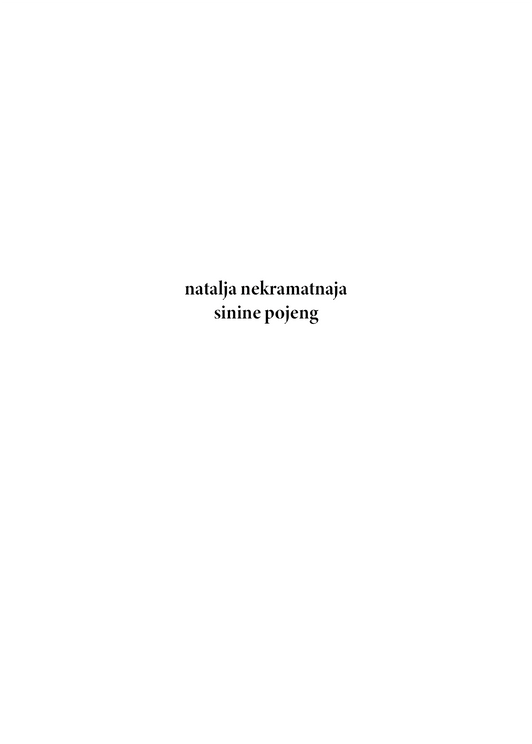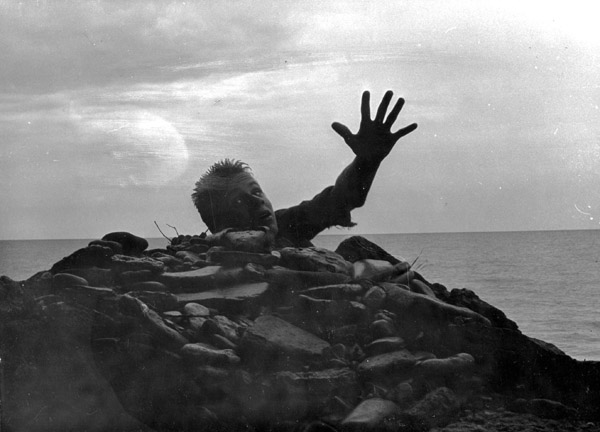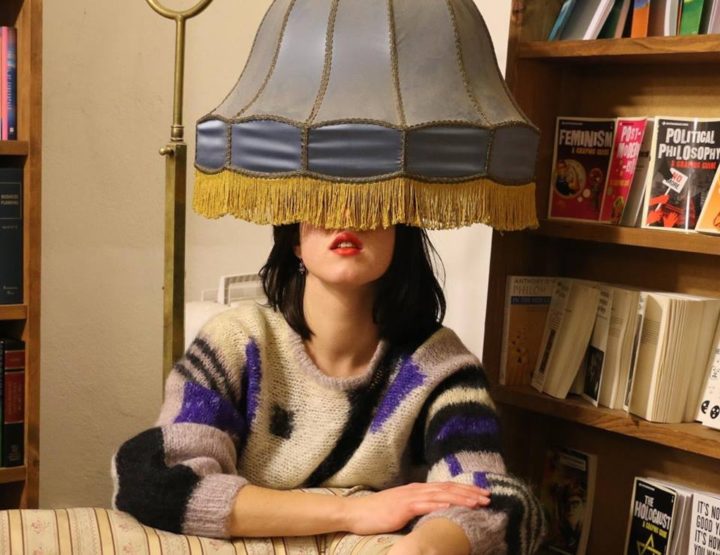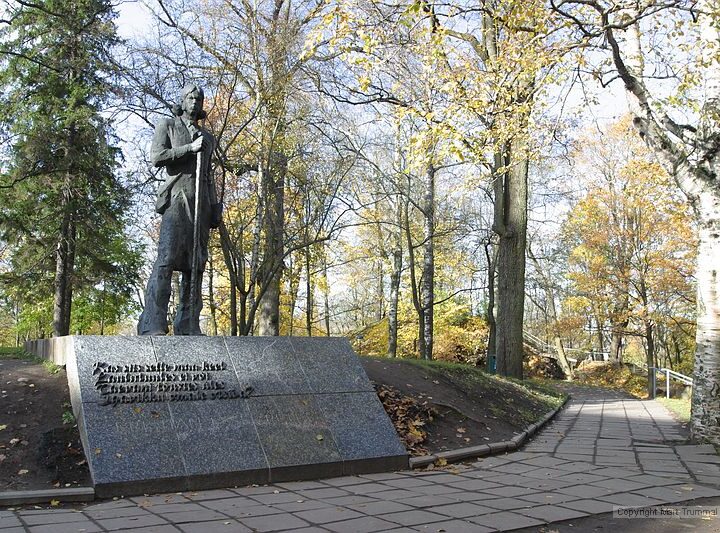Natalja Nekramatnaja’s debut poetry collection Sinine pojeng (Blue Peonies) is severe, and truly exceptional in a year of otherwise polite and somewhat dull Estonian poetry. A perfunctory review would label it a classical work rooted in a hackneyed loser’s voice.
The lyrical narrator is a woman, primarily pained by family traumas: a miscarried son, memories of an abusive father, a childhood in a bleak industrial Eastern Estonia, the deaths of loved ones, and more. This character observes reality in shades of black and white (p. 83) and is afflicted by homelessness and deformed lust (p. 76). Plenty of poetry has been written on similar topics before.
Nevertheless, Nekramatnaja’s writing remains fresh and powerful thanks to the several interacting attributes. Firstly, her negative poems contain intense, irate, highly charged imagery. The dedication immediately embarks on this wave: “to the son / I killed” (p. 9). Still, the author does not overburden the poems with excessively grating curses or phrases. There’s usually a change of tempo in which low-energy texts are suddenly dashed with something jarring like a punch to the face. Take this example:
the impersonal child
calls out something
from the rear corner of the room
in sign language
receding further and further
through the crowd
I can’t understand him
it’s like he’s calling for help
until the wind sweeps him away
[…]
I open the toilet door
an angel wipes its ass with a sickle
and calls out
something
I can’t understand it
until the wind
sweeps confusion away too (p. 56)
The second stanza almost matches the first. As the poem’s atmosphere is soft and agonizing, the brusque statement comes as a surprise and even a parody in the given instance.
Secondly, one should note the rhythmic repetition of imagery and subjects throughout the book that bind it into a well-arranged, tightly knit whole. Some images resurface after lengthy pauses, such as the abandoned son:
the impersonal child draws a family
in the air (p. 13)
the watch daddy promised to give the baby I gave up having (p. 24)
they say there’s a lake in the corner of the garden of eden
where all the unborn children swim (p. 28)
I write funny lines on the back of a black-and-white postcard
to the son I’ve abandoned (p. 39)
Other times, Nekramatnaja arranges poems on a common theme in progression, allowing for continuity: on deportation (pp. 18 and 19), a stray dog (pp. 68 and 69), and the death of her abusive father (pp. 22–23 and 24). Some belong to a series in which one repeating image replaces another, such as looking into a mirror (pp. 14 and 15) and extended family (pp. 15 and 16).
Only by the middle of the book does another powerful thematic threat unwind: biblical allusions. The first instance of which is exceptionally powerful:
gangs of troublemakers on bleak streets a trashed bus stop
yowling cats soviet khruschchyovkas with broken windows
the stench of shale oil the mine’s smokestacks billowing
a little girl takes her drunk dad home a proper beating as thanks
an empty stomach sidewalks covered in litter and the smell of urine
a cock and Estonian slurs graffitied on the grocery store window
stray dogs mating and digging through heaps of trash
I close the window take off my glasses let go of the memories
the filthy reek of hopelessness invades my nostrils
I read the bible scratch my clit fall asleep (p. 33)
The poem rides the waves of grim existence in derelict Eastern Estonia, but with a surprising twist. Although it initially seems like the Bible is brought in for shock value and contrast, the poem takes a turn where the narrator’s life is threaded with biblical motifs.
we’re coming from narva
we’re going to jerusalem (p. 34)
IT’S RAINING CONSTANTLY IT’S EVENING
on the way to calvary
I order a cold beer on a café patio
you know isaac is pure metaphysics
isaac’s soles are aching pick me up daddy he’d like to ask (p. 53)
but those who walk mount Moriah
they keep the very first silence (p. 55)
but
when grandpa died for the first time
sober[1] abel came to the feast
buck naked (p. 64)
It’s worth mentioning that the kaine/Kain double entendre also appeared in Erkki Luuk’s poetry collection Präät ja Endil (Präät and Endil). Blue Peonies isn’t a single-topic book; rather, its universe and cast of characters gradually expands:
CALL ME ISHMAEL
yells a boy
who’s teased… (p. 40)
Entwining in the narrator’s world are trials endured by Jews and peripheral Estonian communities, which are elevated to such a human plane that “woes and sufferings / all universal” (p. 34). It makes no difference whether you’re in Estonia or Israel, for “the doors of all homes are closed as of today” (p. 28) and “the dogs of hell [are] amidst gethsemane” (p. 75). The biblical agony likewise cuts into the narrator’s own personal space:
MY BROTHER GOT THE TOP BUNK
because it’s paradise above
because the lord is above
but hell and the devil are below (p. 21)
Expressed another way, the narrator stands in the center of a dark, empty room bereft of a single ray of light or hope:
actually we’re in boundless darkness in darkness like this (p. 47)
The overpowering mood that comes with occupying such a space is resignation, occasionally replaced by contorted lust:
finally I cast off my clothes
amidst
a dead space
totally nude
I rub my nipples
[—]
sometimes there’s no desire
to do anything else
no energy
if you stare into emptiness
to discover
emptiness (p. 76)
A hint to the mysterious persona behind the Nekramatnaja pseudonym slips from one of the poems: “…a mihkelson-like voice whines in a maternal / womb…” (p. 25). The remark isn’t made casually. Ene Mihkelson[2] is clearly one of the author’s greatest role models, and her influence is palpable throughout the work: take the lingering sense of itinerance or the cerebral jaunts that appear in the last poem and elsewhere. A balance between the lyrical and the narrative is Mihkelson-like overall. In such texts, Nekramatnaja tends to set the mood with unusual events rather than indulgent emotional expressions, and what’s more, the agonizing situations compress the lyrical subject, tacking them into place (“I stand in the snow in my yard once again and am afraid to move”, p. 29). The subject of the alien gaze threatens the spell-caster with oblivion. Nekramatnaja’s Mihkelson-like tendencies are perhaps most pronounced in the following poem:
I flip a switch the room fills with light
outside, on the other hand – darkness
someone looks in through the window I don’t see them
their gaze remains unattainable
they know all my secrets
now I look out of the window
sacrificing time and eternity
I turn on the television
protests in charlottesville
right-wing extremists attacking blacks
who would light a lamp in the darkness
I walk onward the lights go out
who would light a lamp in the darkness
the glow of TVs flickers from lone windows
I am invisible (p. 46)
The poem takes place in the earlier dark room. The speaker turns out to be invisible, but what’s more bizarre is that she confidently asserts a stranger is looking in but cannot be seen. Consequently, the speaker’s voice is also disembodied, and the poem’s space is being created by another separate gaze that penetrates the lyrical ego and blends with them. An “impersonal individual” forms – coincidentally a recurring theme.
Uncertainty swells to become the narrator’s all-encompassing doubt regarding her poetic reality and suspicion of the imagined. This is revealed through recurring images (“HOW TO TELL YOUR SON YOU MADE HIM UP”, p. 50) and as a generalization:
maybe it’s mere conception
maybe you can’t be sure of anything anymore
maybe all of us here are imagined (p. 72)
A character’s departure from the text leaves a worn, showy, and even cliché impression. Upon first reading, I didn’t focus much on the dimension and regarded it as a stylistic blunder made by a debut author. Literature is imagined, so why make a point of emphasizing it? But is that really the truth? Is every written work nothing more than pure fancy to everyone? Does it also apply to lyrical poetry? What role does the poet’s persona play in the reception of their work? Isn’t it true that the most common manner of poetry’s consumption is the poet’s inclusion into an aesthetic reception? One that presumes that if the writing doesn’t detail the author’s life through artistic embellishment, then it at least expresses their true feelings, convictions, and moods? Isn’t the connection especially apparent with great female poets whose brilliant presence strengthens the writing’s aesthetic impact (Estonian examples might include Marie Under, Doris Kareva, Kristiina Ehin, and Sveta Grigorjeva)?
I don’t enjoy rooting around in an author’s life and always try to cast such layers aside, even in my analysis of Nekramatnaja’s work. However, it would be false to claim that such discussions only arise because of the ignobly inquisitive appetite of the masses. As several researchers have noted, contemporary Estonian literature, including poetry, gravitates strongly towards autobiographical tendencies. Thus, one naturally assumes that behind the Nekramatnaja persona is a talented young woman from Eastern Estonia with an unhappy childhood and the ability to lift poetry with autobiographical DNA to artistic heights. Well-read readers should allow this assumption to drift on the fringes of their consciousness and simply enjoy Nekramatnaja’s fine writing. I find it fitting that the young author hides behind a pen name, not wishing to shine bright in the media. Unfortunately, it’s impossible to completely shut yourself off from literary gossip, and so I’ve heard that Nekramatnaja is actually a man with an academic background in literature. Such knowledge would place the collection in a whole new context: no autobiographical angst and no murdered son, but merely the agony of the imagined. Give it a try, I suppose!
Leo Luks (b. 1976) is a philosopher, writer, and literary critic. He is an instructor of philosophy at the Estonian University of Life Sciences and a researcher at the Under and Tuglas Literature Center. Luks has published two poetry collections, a monograph on literary philosophy, and three collections of essays.
[1] The Estonian contains an untranslatable play on words involving “kaine” (sober) and “Kain” (Cain). – AC
[2] Ene Mihkelson (1944–2017) was an Estonian writer of prose and poetry.





